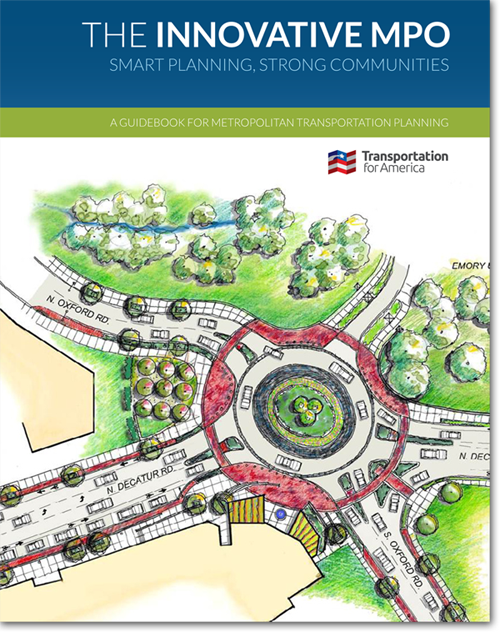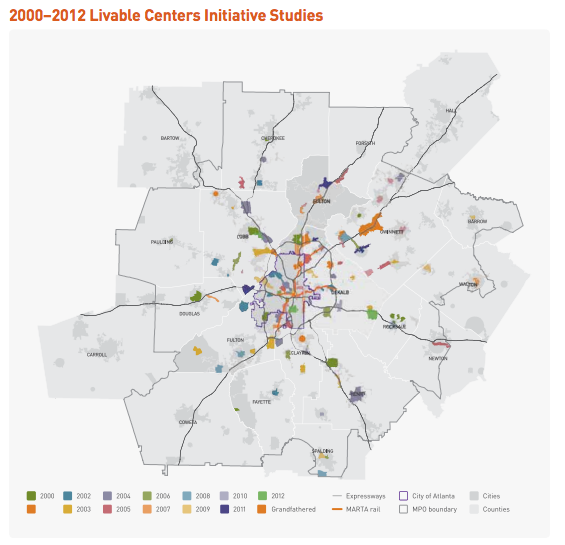
Metro areas on the cutting edge of transportation planning: Introducing The Innovative MPO

On Dec. 10, Transportation for America will release a one-of-a-kind guidebook showcasing leading-edge approaches to regional transportation planning, called “The Innovative MPO.” We will launch it with a webinar the same day, open to all. To learn more and register, click here. In this post, we provide a preview of the kind of topics you’ll encounter in the guidebook.

Click here to register for the Dec. 10 webinar and find out more.
Innovative metropolitan planning organizations (MPOs) are working with business leaders and economic developers to make sure their regions are competitive and attractive to talented workers. They are stretching to maximize the impact of investments by setting priorities for selecting projects and measuring performance.
They are refusing to be bound by existing trends, but instead are planning in tandem with the aspirations of their citizens. They’re using creativity and flexible funds to fill gaps in transit service or break up bottlenecks that impede freight movement. They are reaching out across racial, language and income divides to make plans that can help everybody live prosperous and healthy lives.
This reporter first became aware of MPOs as a journalist covering growth and development issues in Atlanta in the 1990s. MPOs, you may know, are creatures of federal transportation law, which requires metro regions to program funding through a regional planning process. Their role is to ensure that federal investments are coordinated within metropolitan areas so that individual communities are considered along with the needs of the region as a whole.
And, as Atlanta discovered in the late 1990s, MPOs also must ensure that regional transportation plans do their part to keep harmful emissions in check. Just after the 1996 Olympics, the Atlanta Regional Commission — metro Atlanta’s MPO — received notice that the region faced a shut-off of federal funds because its projected emissions were exceeding the limits of a strengthened Clean Air Act. Stories I filed for The Atlanta Journal-Constitution on the crisis made national headlines, because Atlanta was the first to face such sanctions.
The problem was that the region’s long-range transportation plan was based on projections that the region’s out-of-control sprawl would continue as usual for the next 20 years. That would require more and more highway lanes to accommodate longer commutes in congestion that got worse despite the investment, producing untenable levels of vehicle emissions. The only way to make a plan that could meet Clean Air Act requirements was to assume the region would accommodate more of its growth in core areas and town centers. People living and working in those areas would take shorter and fewer car trips, and some could be replaced by other options.
Here’s where I first saw just how innovative an MPO can be.
The ARC had no control over land use — local governments had that authority — and thus little say over the sprawling development. But it turned out that the transportation funding controlled by the MPO offered plenty of opportunity to incentivize better-planned growth. Chief ARC planner Tom Weyandt and his staff came up with the Livable Centers Initiative. The MPO set aside money for competitive grants to support local governments planning for compact, walkable town centers and corridors. Those with smart plans would then be in line for a much larger pool of money for transportation projects to fulfill those plans.
The Livable Centers program not only helped restore the region to compliance with the Clean Air Act and avoid financial penalties, it also unleashed a wave of pent-up demand from communities that were bursting with ideas for reviving moribund downtowns or transforming tired commercial corridors. It helped change regional planning to ensure that transportation spending was in line with overarching goals and created a framework for prioritizing projects.
The LCI program in Atlanta is just the tip of the iceberg of what MPOs can do to help ensure the long-term economic health and quality of life in their regions.

The type of studies conducted in the Atlanta metro region from 2000-2012. Source: ARC
Innovations are not limited to the rich regions on the coasts, but are cropping up all across the country in MPOs of all sizes. It may be no surprise that the MPO in the San Francisco Bay Area has developed a sophisticated method for scoring potential projects that evaluates impacts on everything from climate to access to jobs for lower-income residents. Or that Metro in Portland, OR, puts dollars from the federal highways, transit and bike/ped pots into a combined fund that goes to the projects — whatever they may be — that best serve the region’s overall goals for development, equitable distribution of benefits and sustainability.
But did you know Nashville’s MPO is a leader in soliciting public engagement across race, income and age and is pioneering ways to evaluate impacts on health and safety, and prioritize projects accordingly? Or that the Tulsa, OK, MPO literally takes its planning to the people on a specially equipped bus, while the Flagstaff, AZ, MPO figured out a way to use the flexibility of federal funds to sustain a critical bus service?
The Denver MPO has partnered with the local AARP chapter to create “Boomer Bonds” that help local governments around the region create age-friendly environments, allowing older adults to remain in their homes and communities for as long as they desire. The Savannah, GA, MPO has put together a sophisticated program to ensure the performance of its port, rail and trucking networks in a way that also keeps residents safe, healthy and mobile.
This is just a quick sample of the initiatives large and small that you’ll find in The Innovative MPO, which will be released next Wednesday, December 10. The full guidebook features 30 useful tools from seven areas of focus, 20 detailed case studies (like Atlanta’s) and more than 50 real-world examples from MPOs in regions large and small. There’s also an MPO 101 appendix with a simple, clear explanation of what MPOs are and what they do.
There is a lot to be excited about, and there will be even more to celebrate as MPOs swap their good ideas and challenge each other to push even farther to put transportation dollars to work for the long-term health and prosperity of their people.
We will be hosting a webinar on the day of the release, December 10th at 1p.m. EST. Register here.



